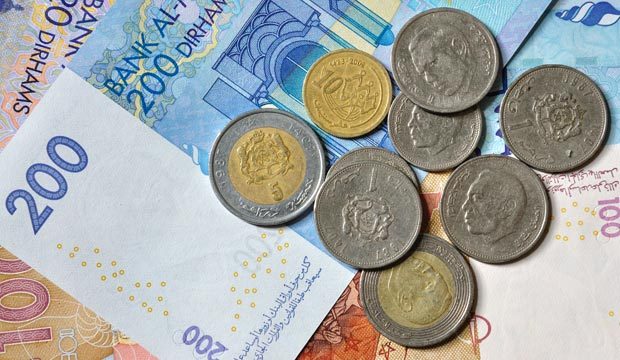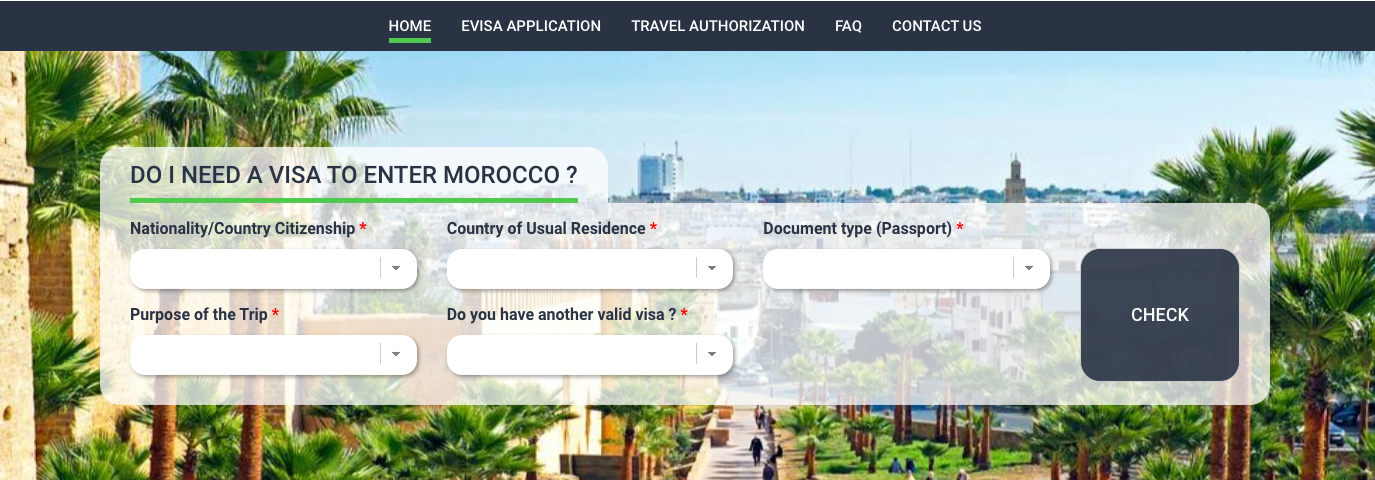Travel Requirements for Morocco
Passport Requirement
If you are visiting Morocco, your passport should be valid for 6 months from the date you arrive.
Visa Requirement
"Do I need a visa to enter Morocco?"
The need for a visa depends on your nationality. BEFORE you purchase a visa, please check if your nationality requires it by using the Access Maroc portal. It is possible to submit and track applications for E-Visa or AEVM (Electronic Travel Authorizations to Morocco) through Access Maroc portal.
For all nationalities, the maximum duration of the tourist trip is 90 days. A request for an extension can be made at the nearest police station to stay an additional 90 days.
Covid-19 Requirements
Moroccan authorities have lifted all restrictions related to the COVID-19 pandemic.
Travelers are required to comply with the health requirements of their final destination country. It is the sole responsibility of travelers to inform themselves and comply with the sanitary requirements of the countries of departure and destination.
Obtaining Health Insurance
If you travel internationally you should buy appropriate travel insurance before you go, covering you for existing physical or mental health conditions (including those currently under investigation) and any activities you will be doing whilst you are away.
If you do not have appropriate insurance before you travel, you could be liable for emergency expenses, including medical treatment, which may be costly.
If traveling with prescription medication, check with the Government of Morocco Ministry of Foreign Affairs to ensure the medication is legal in Morocco. Always carry your prescription medication in original packaging, along with your doctor’s prescription.
Vaccinations
Be up-to-date on all recommended vaccinations .
Currency
Exchanging Moroccan Dirham
Moroccan dirham is a closed currency, which means you can’t obtain it outside the country.
You can exchange your pounds for dirhams in banks, hotels and Bureaus de Change in an airport or port - and turn any leftover money back at the end of your trip. If you have any leftover dirham from a previous trip, you can take up 2,000 dirham into Morocco with you. There’s no limit to the amount of foreign cash you bring into the country.
Can I use my card in Morocco?
Many tourist destinations will accept payment with a debit or credit card, and you can use them in most ATMs. Mastercard and Visa are widely accepted, while it is generally more challenging to find places that take Amex or Diners Club, so you will be better off taking an alternative card or cash as backup.
Tipping and haggling in Morocco
Haggling over prices is standard practice in Morocco, especially in markets or souks. You can also haggle for some services, such as car rental or hiring a guide for the day. Prices are usually fixed in restaurants, supermarkets and stores.
Tips aren’t mandatory, but if you’re happy with the service you’ve received, a tip is always appreciated. As in most destinations, it’s very common to round up a bill or leave some cash at the end of a meal.
Getting Moroccan dirham before your trip
Because it’s a closed currency, you can’t buy dirhams in the UK or any other country outside Morocco. Most travellers take pounds sterling and exchange them in Morocco. You can also withdraw dirhams from an ATM, either with your own bank card or a Travelex Money Card.
It’s a good idea to get hold of some dirhams as soon as you can after arrival, as not everywhere will take cards.
The Moroccan Dirham (MAD)

Current bank notes in Morocco
Need some more detail on what currency does Morocco use? Let’s take a look at coinage and notes.
Dirham notes come in the following denominations:
- 20 dirham (purple)
- 50 dirham (green)
- 100 dirham (brown)
- 200 dirham (blue)
Current coins in Morocco
Need some more detail on what currency does Morocco use? Let’s take a look at coinage and notes.
The coins currently in circulation are:
- 10 santimat
- 20 santimat
- ½ dirham
- 1 dirham
- 5 dirhams
- 10 dirhams
PLEASE NOTE: Since Moroccan dirhams aren’t available outside of the country, you won’t be able to pick up any before you head off.
Culture and Etiquette
Moroccans are typically welcoming and friendly people. If you are fortunate to make Moroccan friends or be welcomed into a family, it will make your stay all the more memorable and give you friends for life!
Having said this, Moroccan culture can be very different to ‘home’ and a few simple pointers will ensure you make the most of your trip.
Dress Code
Morocco is a Muslim country, so it goes without saying that you should be mindful of your public behaviour and the way in which you choose to dress. In cities, you will see Moroccans dressing at all points along a spectrum from conservative Muslim costume to modern western-style clothes.
In tourist areas, Western casual wear is tolerated, although it is still best to dress modestly. Both men and women should aim to cover their shoulders and women’s dresses, shorts and skirts should fall at least to the knee. More conservative or less educated Moroccans have limited experience of other countries or dress codes and may make judgements based on your attire. For women in particular, a more modest dress code can help avoid such judgements and unwanted attention.
In the more remote or rural areas, you will see everyone is much more covered up and so modest clothing should always be worn, with both men and women covering their shoulders and legs. If entering a religious site, shoes should be removed and women should cover their heads with a scarf.
Beachwear is accepted in tourist beach resorts, however you should not change your clothes on the beach. Instead, use a beachside changing cabin.
Smoking and drinking
Many Moroccan people smoke and drink alcohol despite the rules of Islam. As a tourist we recommend that you observe the behaviour of those Moroccans whom you are with and smoke/drink alcohol discreetly and in moderation. It’s no bad thing to ask your host or guide for permission or guidance in order to show respect. Never smoke inside a private home unless you are invited to. It is rare to see Moroccan women smoking in the street, and even men tend to smoke indoors, e.g. in cafes.
Taking photographs
Before taking photos of people, always ask their permission first. Do not be surprised if your request is refused. Women in rural and conservative communities will often not allow you to take their picture and say “pas de photo”. Some may allow you to take a photo and may want to be paid for the privilege.
Meeting and greeting in public
When introductions are made, it is quite customary to ask after your counterpart’s family and health.
In traditional families and communities, men and women seldom mix. The most common way to greet a person of the same gender in Morocco is to either offer a light handshake. Moroccans who have a lot of contact with foreigners will often shake the hands of men and women. More religious people will not have any physical contact with those of the opposite sex and men may refuse to shake the hand of a woman. This should not be taken as an insult - it is very common among pious Muslims.
Among family and friends of the same sex, Moroccans are very effusive with their greetings and once you are well-acquainted with your Moroccan friends, you will become absorbed into a ritual of simultaneous handshaking kissing of both cheeks (kissing the left cheek first). This should only be done with a person of the same gender. Don’t be surprised if older women another woman several times on one cheek, or even on the forehead - be ready!
In public, you should be aware that it is considered good manners for men and women to leave space in between one another. Handholding is only usually seen as a platonic gesture between people of the same sex. Public displays of affection (even between Westerners) are not really acceptable or respectful to local traditions.
For a woman to sit alone in a bar or cafe is socially unacceptable, unless it is a frequented by tourists. Women should be very alert to the possibility that they may seen as prostitutes! If female and planning to venture out alone, avoid male-dominated local cafes and bars. it is best to attempt to go out in a group or be accompanied by a man. Women should also be wary of men contravening the advice above and seeking to be ‘over friendly.’
